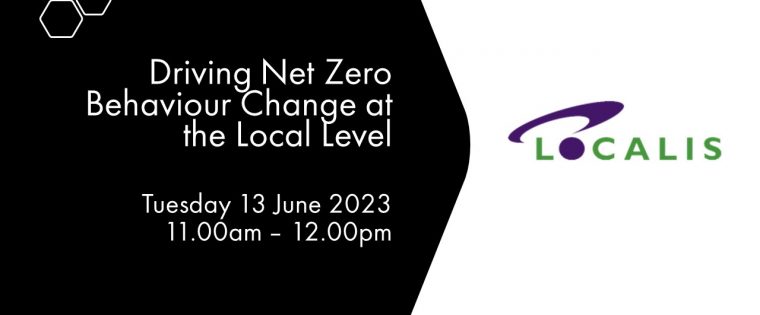Driving Net Zero Behaviour Change at the Local Level : policy webinar, Tuesday 13 June from 11.00 to 12.00

Background and context:
Between 1990 to 2018 the UK reduced emissions by more than 40 percent. This vital progress in the transition has largely been achieved through the decarbonisation of the power sector. However, as the Climate Change Committee have pointed out ‘over half of emissions reduction needed to meet the Sixth Carbon Budget involves people making low-carbon choices’. These choices related to aspects such as diet, active travel, and the use of low-carbon technology.
Key to delivering this much needed step change will be driving behavioural change through effective community and citizen engagement on Net Zero. However, a key obstacle standing in the way of this is a low level of awareness regarding the multitude of changes needed to be implemented on a personal and local level. As such, multiple stakeholders have called on the government to develop a detailed public engagement strategy on net zero to set the overarching framework to drive the required behavioural change.
While undoubtedly there is a significant need for this, it will be at the local level where this behavioural shift will be first realised and directed by the local state. At the local level, councils have been taking assertive steps to show their willingness to address and fight climate change with over 308 authorities declaring climate emergencies.
They have higher levels of trust, more nuanced knowledge, and greater access to the population – placing them ideally to encourage small changes in behaviour that can add up to a major dent in carbon emissions. Moreover, it will be local authorities who will be key to translating how national objectives of the transition should align with local objectives and setting out how local residents can best engage in this process and how best to align their behaviour accordingly.
Yet recent high-profile controversies and polarising debates have illustrated the challenge in bringing the public along with net zero policies. Moreover, given the current immediate context of the concurrent cost of living and energy crises that communities find themselves in, there is a wider issue of capacity to engage. Most people dealing with immediate socio-economic pressures from multiple angles do not have the capacity to engage with this aspect of the transition to net zero at the moment.
Aims and objectives of webinar:
With this context in mind, this webinar examined how councils can best engage citizens in the transition to net zero, in a meaningful exchange of public information and resident concerns. It explored cases where effective engagement on the local level has been used to help drive behavioural change, whilst also looking at what local authorities need to do better, in light of current challenges citizens face, to tailor engagement to concurrently address their immediate concerns as well as the importance of their individual behavioural habits in the transition to net zero. The guiding questions for panelists to consider include:
- Placed against current government strategies and plans, is the net zero agenda being effectively understood and acted upon by everyday citizens and wider civil society?
- What are some effective ways for councils to engage residents about the behavioural changes we must all make to facilitate the net zero transition? And what are the different levels at which this engagement would have to operate to drive effective change within localities?
- How can councils use their links into communities to conduct a meaningful public conversation on the costs and benefits of the net zero transition?
- What are the major barriers to public understanding on the importance of behavioural change for a just transition and what can the local and national state do to help lift them?
- How can local state stakeholders play an enabling role in empowering residents over their role in climate action?
Panel line up:
- Sean Hanson, chief executive, iMPOWER
- Mark Wilson, Research Associate at the Centre for Climate Change and Social Transformations (CAST), University of Bath
- Jo Wall, Senior Strategy Director – Climate, Local Partnerships
- Justin Galliford, CEO, Norse Group
